Overview
The article titled "7 Benefits of AI Continuous Testing for Software Quality" delves into the significant advantages that AI continuous testing brings to software quality. It begins by addressing the common challenges developers face in ensuring high-quality software releases. AI continuous testing emerges as a solution, enhancing test coverage and reducing issue detection times. Furthermore, it fosters collaboration between development and QA teams, which is crucial for successful software projects. As a result, organizations that adopt these practices report notable increases in test effectiveness and efficiency, ultimately leading to superior software quality. This overview encourages readers to consider the transformative impact of AI continuous testing on their development processes.
Introduction
In the dynamic world of software development, developers frequently encounter significant challenges in ensuring quality and efficiency. The integration of AI continuous testing is reshaping how teams approach these issues. By automating testing processes and providing real-time insights, organizations can enhance their software delivery while significantly reducing the time and effort spent on manual evaluations. Furthermore, as teams strive for excellence, they often face obstacles in maintaining comprehensive test coverage and managing evolving application requirements.
How can developers leverage AI-driven solutions to not only overcome these hurdles but also elevate their coding practices to meet the demands of today’s fast-paced tech landscape? Kodezi addresses these challenges head-on, offering features designed to streamline testing and improve overall productivity. With its robust tools, Kodezi empowers teams to navigate the complexities of modern software development effectively.
By utilizing Kodezi, developers can expect enhanced productivity and improved code quality. The platform’s capabilities allow for seamless integration into existing workflows, ensuring that teams can adapt quickly to changing requirements. In addition, Kodezi provides valuable insights that help developers refine their coding practices, ultimately leading to higher quality software.
Explore the tools available on Kodezi’s platform and discover how they can transform your approach to software testing and development. Embrace the future of coding with AI-driven solutions that not only simplify processes but also elevate your coding standards.
Kodezi | Professional OpenAPI Specification Generator - AI Dev-Tool: Automate Quality Assurance with AI
Developers often encounter significant challenges when it comes to maintaining accurate and up-to-date API documentation. Kodezi steps in to address these issues with its professional OpenAPI specification generator, which automates various aspects of quality assurance. By integrating AI continuous testing, Kodezi enhances the process of generating and maintaining API documentation, ensuring it aligns with the codebase. This automation not only reduces manual effort but also minimizes errors, allowing teams to focus on more strategic tasks.
Furthermore, Kodezi CLI empowers engineering teams by automatically creating OpenAPI 3.0 specifications and hosting Swagger UI sites for API evaluation. This enhances clarity and compliance, making the documentation process more efficient. Imagine the time saved when documentation reflects the current state of the code without the need for manual updates. In addition, Kodezi offers automated code assessments and synchronization of API documentation, making it an essential resource for teams striving for high-quality software delivery with AI continuous testing.
The benefits of using Kodezi are clear: improved productivity and enhanced code quality. Why settle for outdated documentation when you can have a tool that keeps everything in sync? Explore the tools available on the Kodezi platform and elevate your coding practices today.
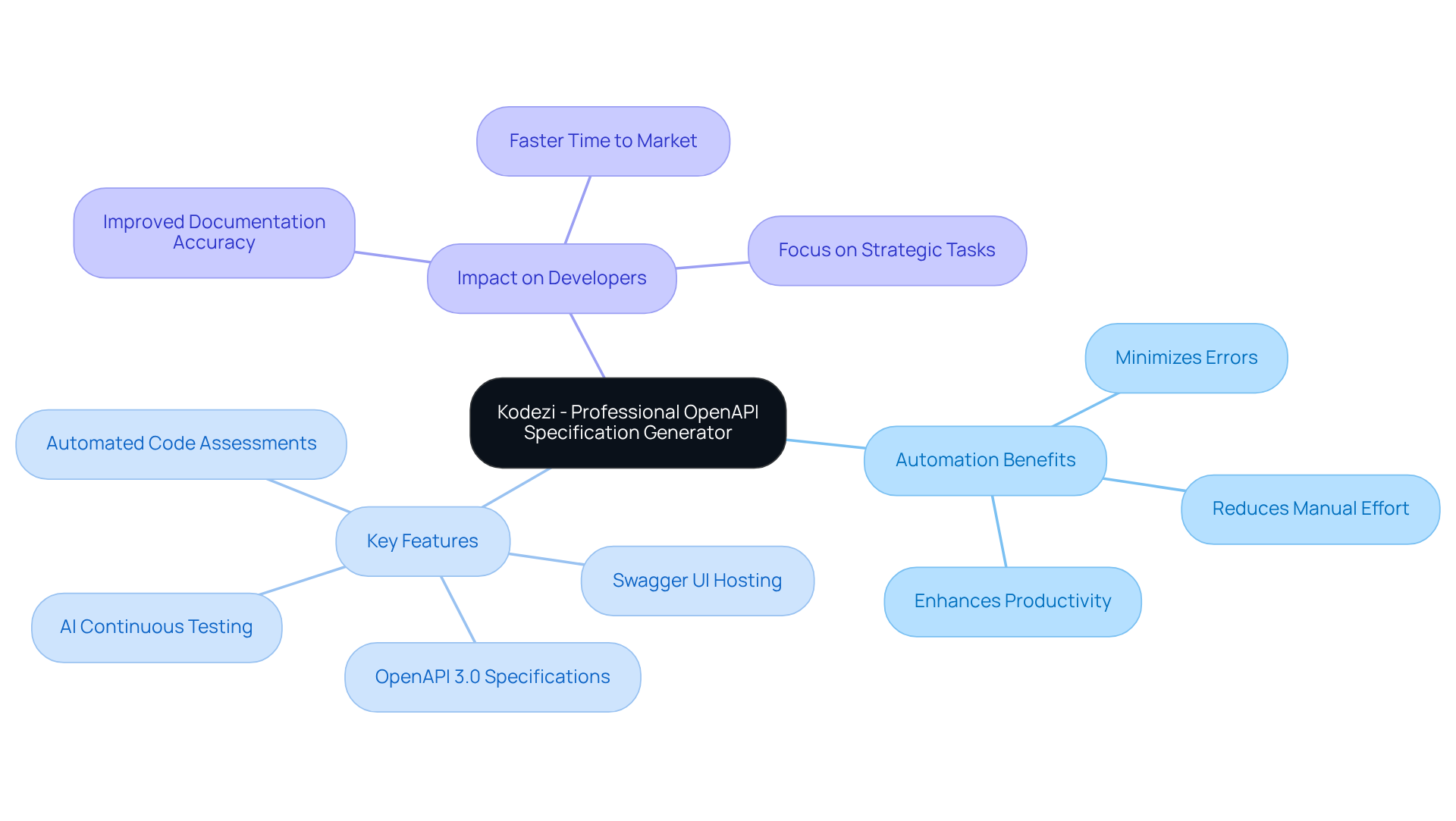
BlazeMeter: Accelerate Testing Efficiency with AI-Powered Solutions
Developers often face significant challenges when it comes to ensuring the performance and functionality of their applications. BlazeMeter stands out as a platform for AI continuous testing, designed to enhance efficiency across various applications, including web, mobile, and APIs. By leveraging AI technology, BlazeMeter facilitates AI continuous testing through the automation of test creation and execution, allowing teams to swiftly identify performance bottlenecks and functional issues.
Furthermore, its ability to replicate real-world user traffic facilitates comprehensive assessment scenarios. This ensures that applications are capable of managing anticipated loads effectively. As a result, this efficiency not only accelerates the evaluation process but also significantly improves the overall quality of the application being developed. Have you considered how such a tool could transform your development workflow?
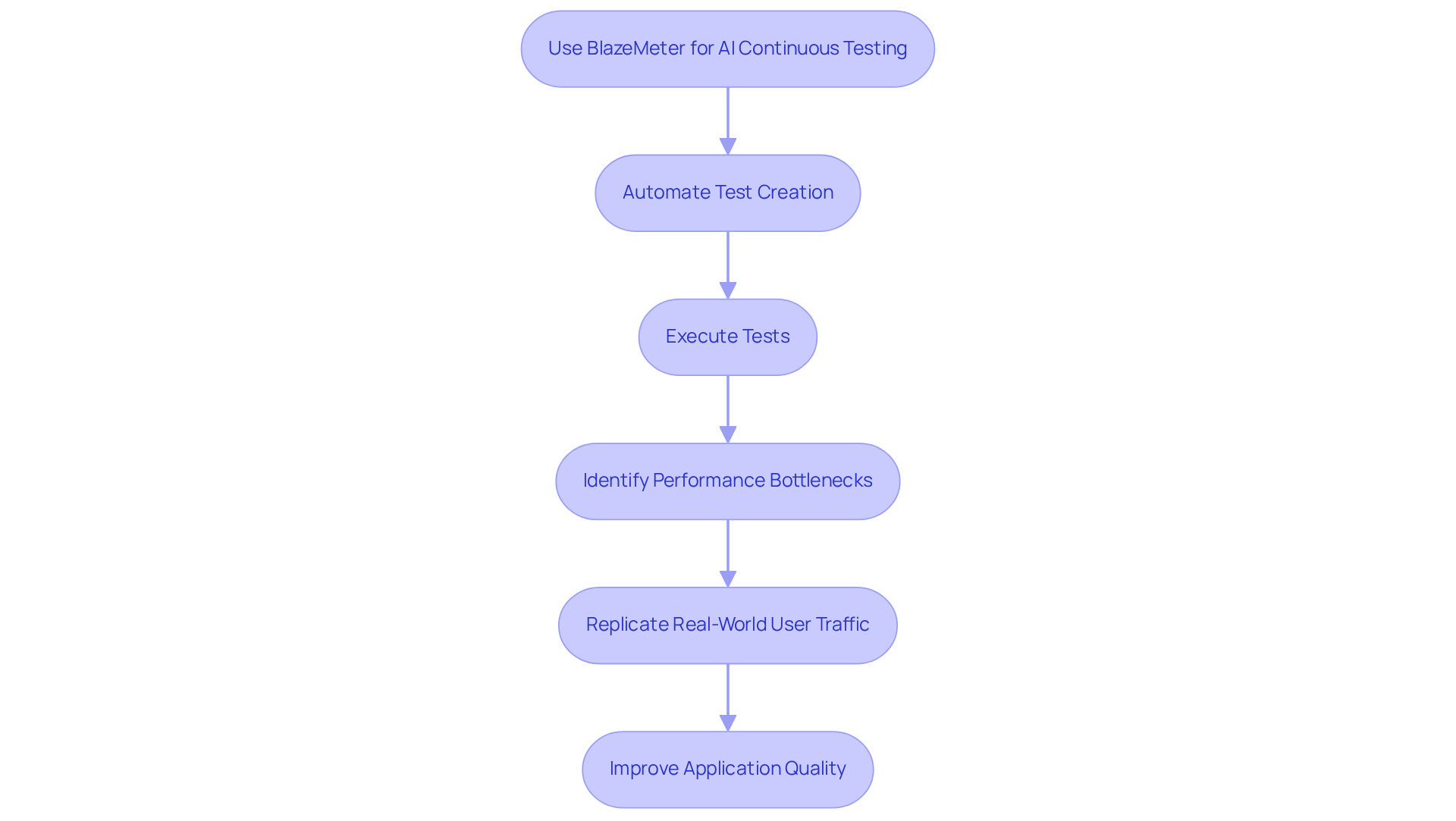
Harness: Transform Software Delivery with Continuous Testing Practices
In the ever-evolving landscape of software development, coding challenges are a common hurdle for many developers. Harness is a platform that revolutionizes application delivery through its AI continuous testing methods. By seamlessly incorporating AI continuous testing into the CI/CD pipeline, Harness guarantees that every code change experiences automatic assessment, providing instant feedback to developers. This proactive approach, utilizing AI continuous testing, greatly reduces the likelihood of defects reaching production, allowing teams to deliver high-quality software more frequently.
Furthermore, AI continuous testing not only enhances collaboration between development and QA teams but also fosters a culture of excellence within the organization. Organizations utilizing CI/CD pipelines experience an average decrease of 33% in time-to-market. Those that implement AI continuous testing practices report a remarkable 40% reduction in post-release defects. In fact, the adoption of AI continuous testing surged from 16% to more than 50% in 2025, reflecting a growing recognition of its critical role in enhancing software delivery quality.
So, how can your organization benefit from these advancements? By exploring the tools available on the Harness platform, you can address common coding challenges effectively and improve your overall productivity and code quality.
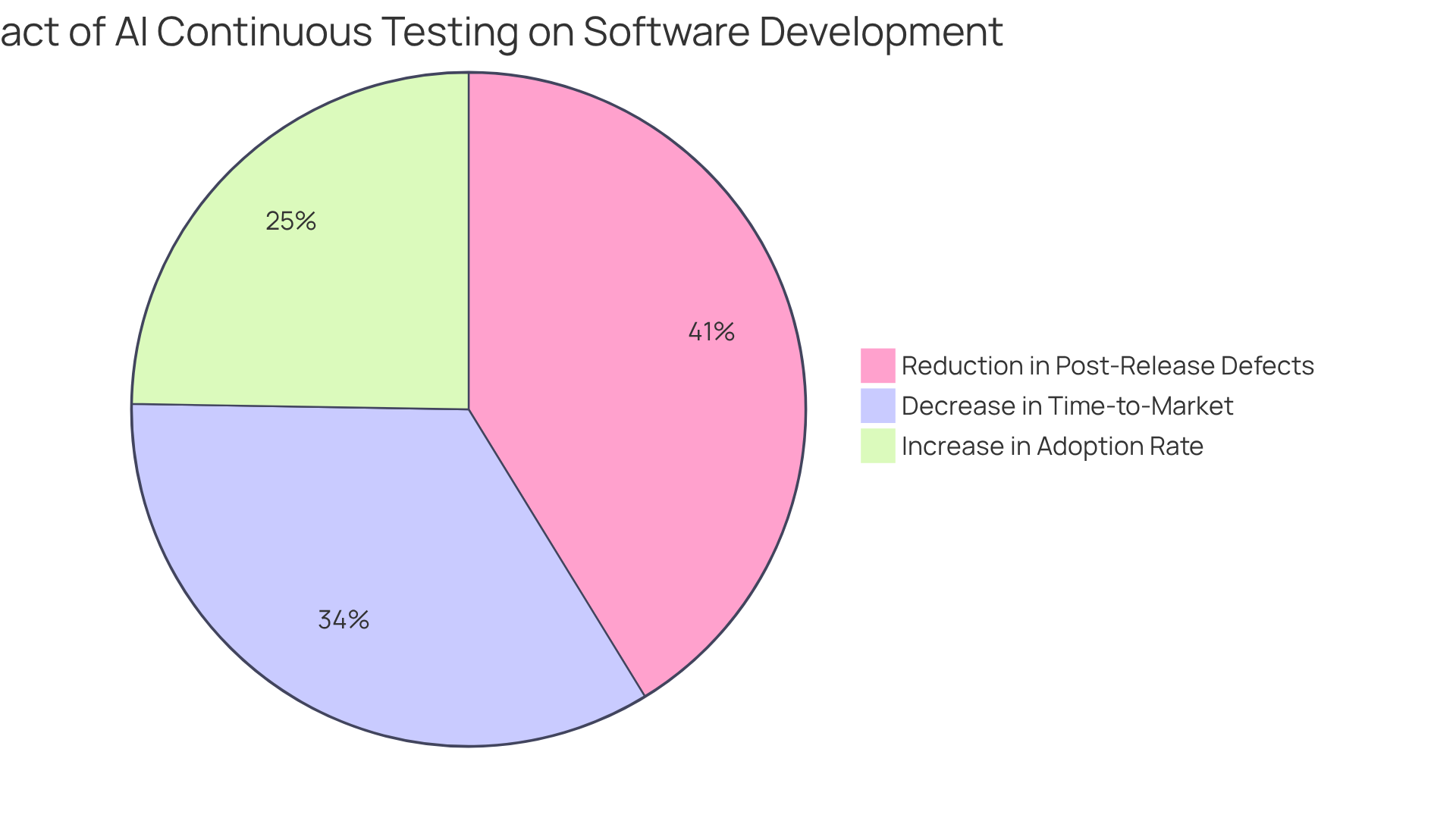
Digital.ai: Minimize Test Maintenance with Intelligent Automation
In today's fast-paced development environment, teams often grapple with the challenges of maintaining test scripts through AI continuous testing amid constant application changes. Digital.ai addresses these issues through AI continuous testing and intelligent automation, which significantly reduces the manual workload associated with test maintenance. By utilizing AI continuous testing to automate the updating of test scripts, QA groups can shift their focus to more critical evaluation activities. This not only conserves valuable time but also enhances the reliability of tests with AI continuous testing, ensuring they remain in sync with the current application state.
Furthermore, organizations that utilize AI continuous testing and automated evaluation tools report an impressive average reduction of up to 60% in manual efforts. This shift allows for a more efficient allocation of resources, ultimately leading to greater test coverage and accelerated release cycles due to AI continuous testing. As teams strive to improve productivity and uphold high standards, the integration of AI continuous testing tools from Digital.ai becomes increasingly essential. Are you ready to optimize your testing process and enhance your team's efficiency?
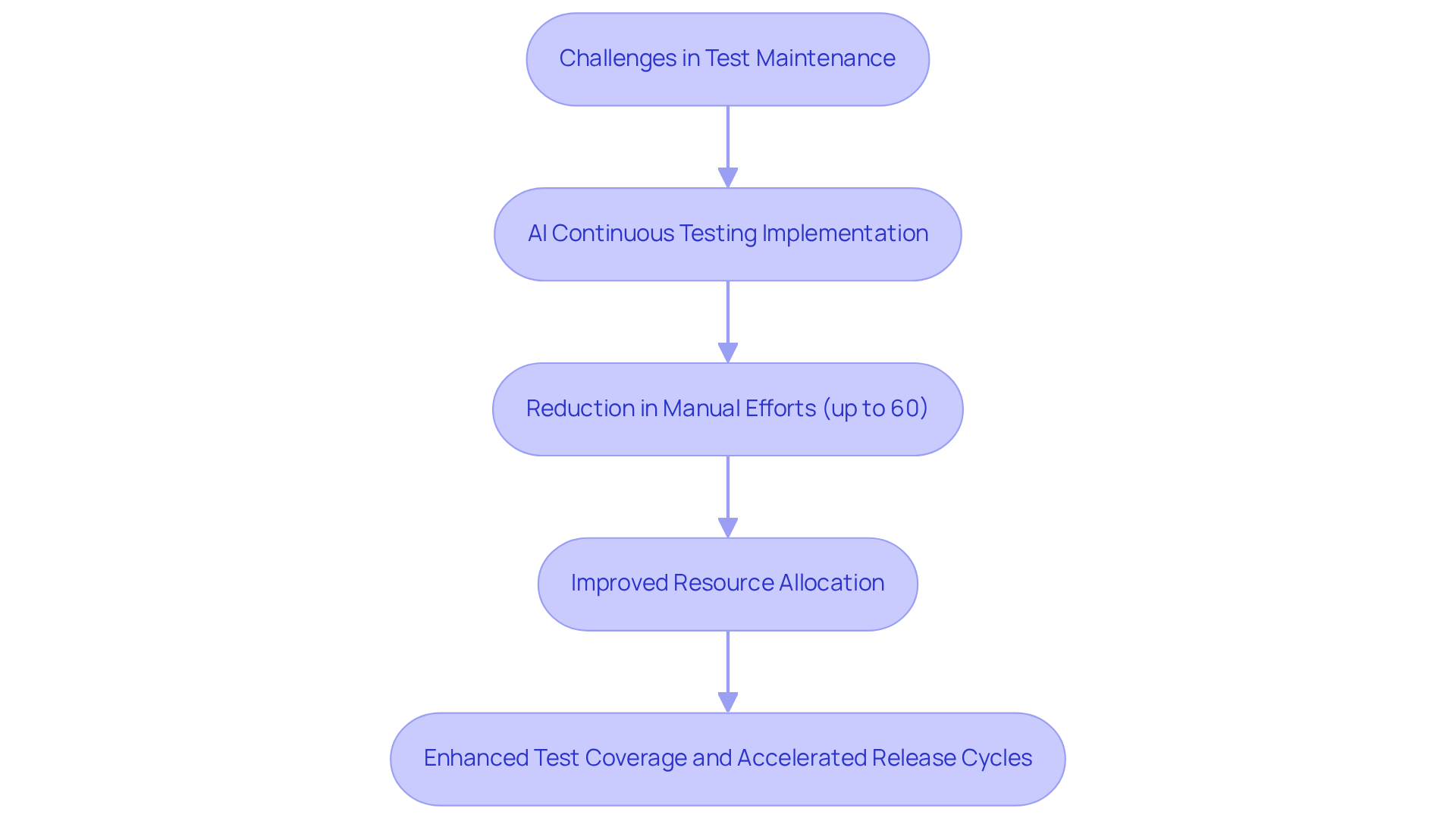
AI-Driven Testing: Enhance Coverage and Reliability in Software Quality Assurance
Developers often encounter significant challenges in ensuring application quality, particularly when it comes to AI continuous testing. How can they effectively manage these complexities? Kodezi addresses these issues by leveraging AI continuous testing, which automates test case creation and adapts to changes in applications. This not only streamlines the testing process but also enhances the reliability of application quality assurance.
Furthermore, Kodezi’s AI improves code changes made by developers throughout the software development lifecycle. With automated builds, the integration process becomes more efficient, allowing teams to focus on what truly matters—delivering high-quality software. Approximately 68% of organizations are now utilizing generative AI for AI continuous testing, reflecting a notable shift towards embracing these advanced capabilities.
In addition, Kodezi employs a data-focused approach by analyzing historical data and user interactions. This enables AI to pinpoint critical evaluation areas, ensuring comprehensive coverage across applications. By learning from past test outcomes, AI can forecast potential failures and adjust assessment strategies accordingly. For instance, organizations that have implemented AI continuous testing in their workflows have reported a remarkable 35% increase in defect identification compared to traditional methods.
Similarly, 60% of organizations using test automation have noted significant improvements in application quality. This proactive strategy not only enhances test reliability but also mitigates the risk of defects in production. Ultimately, this leads to higher-quality applications. Are you ready to explore the tools available on the Kodezi platform and elevate your coding practices?
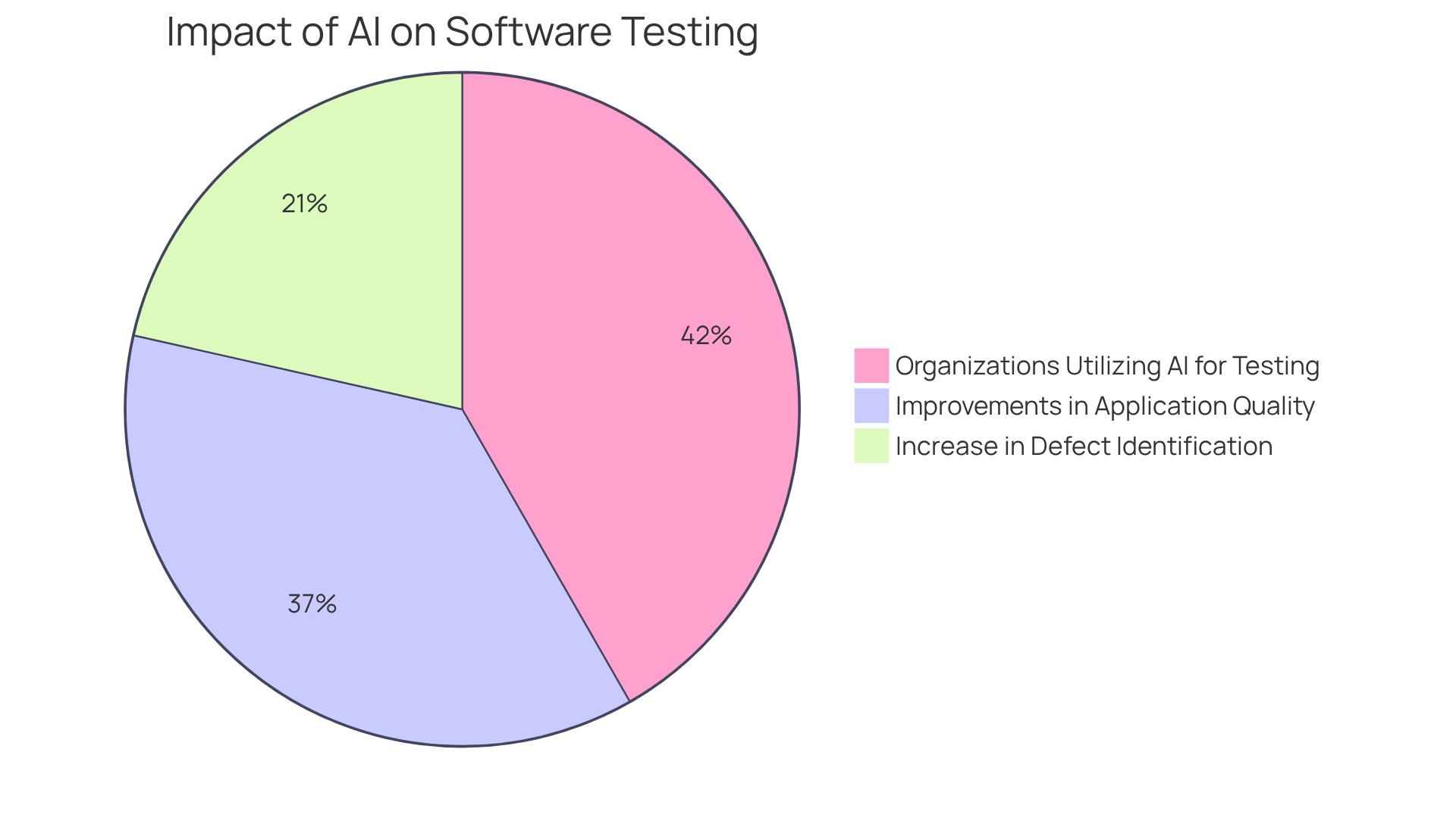
Continuous Testing: Accelerate Feedback Loops for Rapid Issue Detection
In the realm of software development, AI continuous testing significantly accelerates feedback loops by embedding assessment into every phase of the development lifecycle. This proactive strategy allows teams to utilize AI continuous testing to identify problems early—an essential step since the expense and effort required to correct defects escalate as development progresses. By providing prompt feedback on code modifications, AI continuous testing fosters a culture of excellence and accountability among development teams. This swift detection of issues not only enhances the overall quality of the application but also fosters improved collaboration through AI continuous testing, as developers and testers work together to resolve problems promptly. Furthermore, organizations that adopt ongoing evaluation practices report a 40% reduction in post-release defects, underscoring the effectiveness of early issue detection in maintaining software integrity.
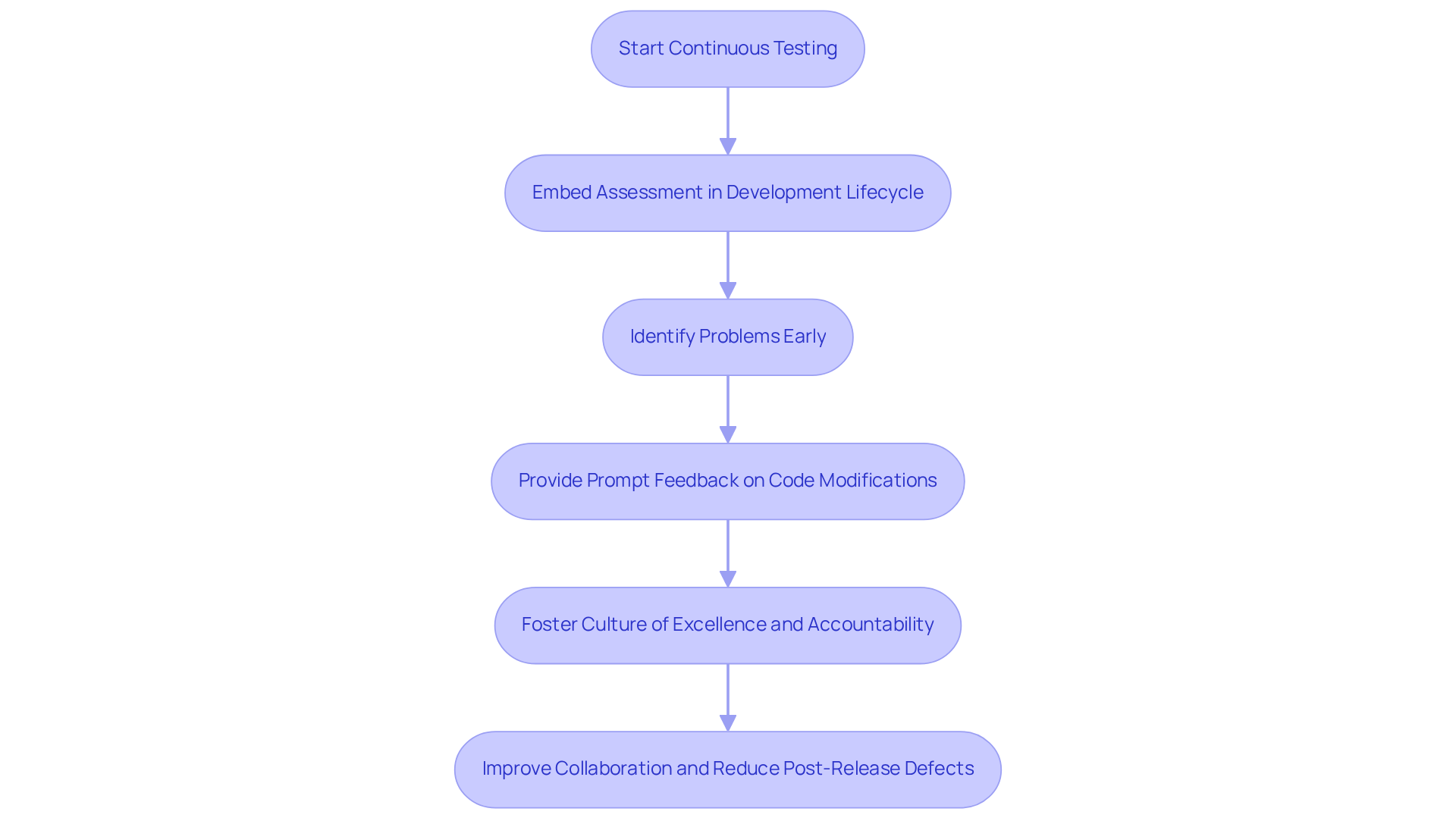
Future of Continuous Testing: Innovations Shaping Software Quality Assurance
The landscape of continuous evaluation is undergoing a significant transformation due to advancements in AI, machine learning, and advanced analytics. These technologies present smart evaluation strategies that adapt dynamically to evolving application environments and user behaviors. As organizations increasingly embrace DevOps practices, the importance of ongoing evaluation in maintaining application quality is set to grow.
How can organizations keep pace with these rapid changes? Innovations such as self-healing tests autonomously detect and resolve issues, streamlining testing processes and significantly reducing manual effort. Similarly, predictive analytics forecast potential defects, allowing teams to address issues proactively.
Furthermore, automated test case generation enhances overall software reliability by ensuring comprehensive coverage with minimal human intervention. By staying abreast of these trends, teams can effectively leverage new tools and methodologies, ultimately leading to improved assurance and accelerated delivery cycles.
Are you ready to explore how these advancements can transform your evaluation processes? Embracing these technologies not only enhances productivity but also elevates the quality of your applications.
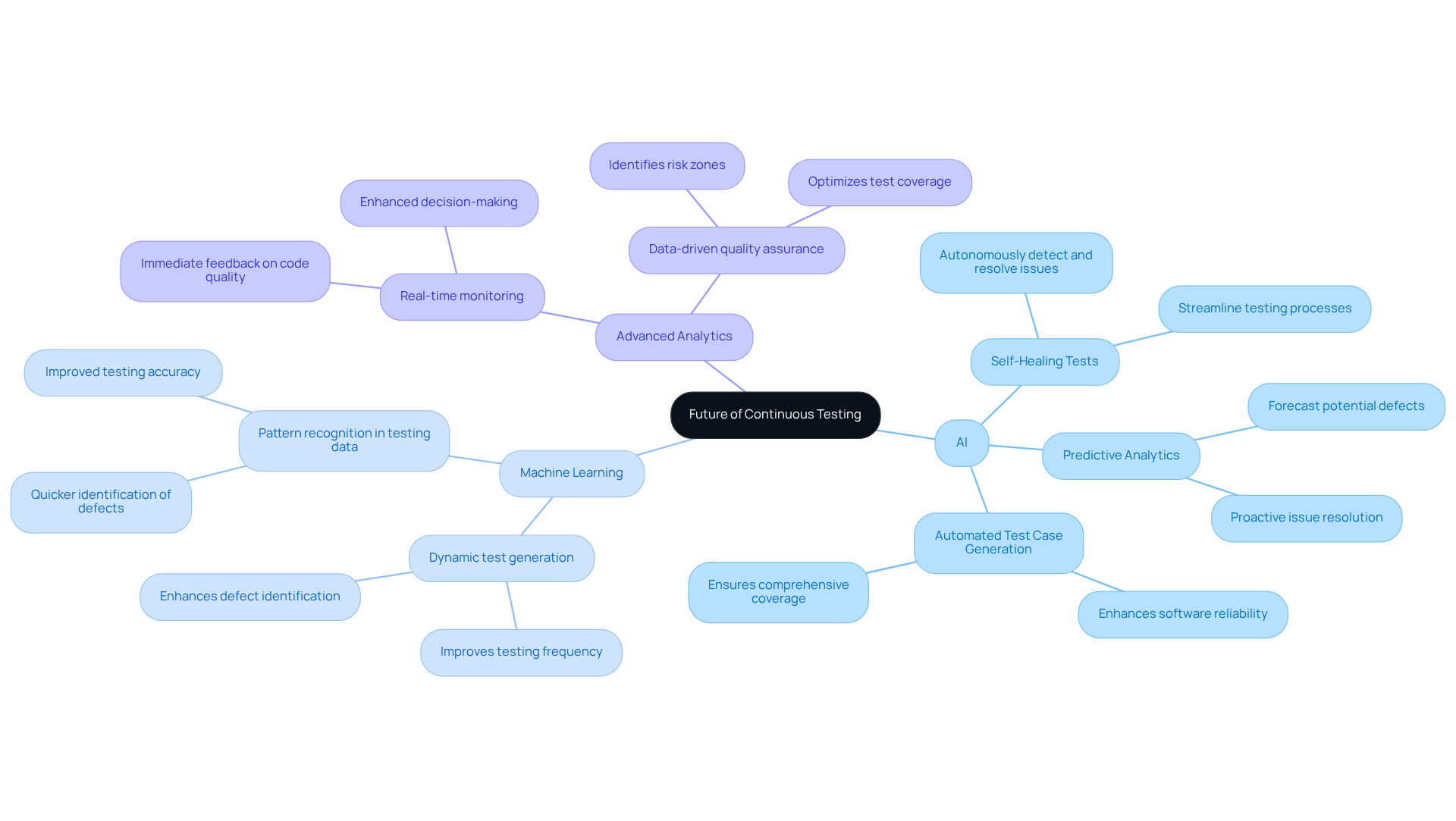
AI in QA: Revolutionizing Testing for Quality and Speed
AI is fundamentally altering assurance processes by automating repetitive tasks, enhancing test precision, and speeding up evaluation cycles. Developers often face challenges in maintaining code quality and efficiency. How can they overcome these hurdles? By employing machine learning algorithms, AI can analyze extensive datasets to identify patterns and predict potential issues before they manifest. Tools like Kodezi exemplify this transformation by providing automatic code correction and bug analysis, significantly enhancing productivity for programmers across various industries.
This proactive strategy not only enhances quality assurance but also greatly decreases execution time, allowing teams to provide high-quality products more quickly. Indeed, 84% of organizations started integrating AI technologies into their development lifecycles (SDLCs) between six months to five years ago, and 71% intend to include AI in their application development processes, indicating an increasing acknowledgment of its significance. The advantages of AI in quality assurance are significant: it can result in a 30% decrease in testing expenses and a 25% improvement in testing efficiency. Furthermore, 75% of technology executives observe up to a 50% reduction in development time due to enhanced AI and automation.
As Bruce Mason, UK and Delivery Director, notes, "AI expedites this process without sacrificing accuracy." As a result, teams can meet the demands of today's fast-paced development environments while maintaining a competitive edge. However, organizations must also navigate challenges such as data privacy and security concerns, which are significant barriers to AI adoption. The incorporation of AI continuous testing into QA procedures is no longer optional; it is crucial for organizations aiming for excellence in software standards. Are you ready to explore the tools available on Kodezi and elevate your coding practices?
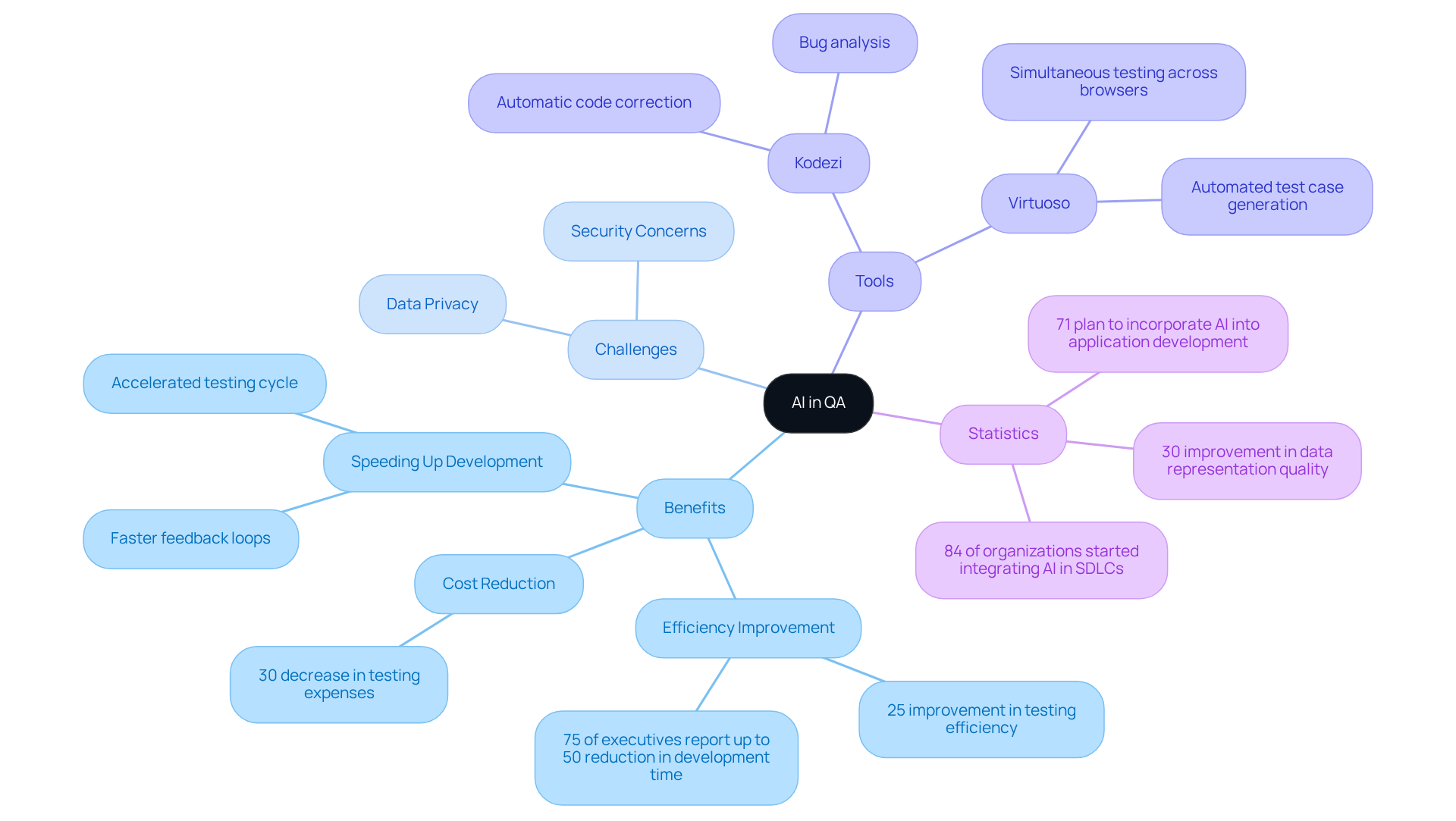
Addressing Pain Points in QA: The Role of Continuous Testing
Ongoing evaluation is essential for tackling common challenges developers face in quality assurance, such as prolonged assessment cycles, high maintenance costs, and insufficient test coverage. Have you ever considered how these obstacles impact your workflow? By integrating evaluation into the CI/CD pipeline, AI continuous testing enables continuous assessment that facilitates the early detection and resolution of issues throughout the development process. This proactive approach can lead to an average reduction of 30% in evaluation cycle times, significantly boosting efficiency. Furthermore, it fosters improved collaboration between development and QA teams, breaking down barriers and promoting a cohesive workflow.
AI continuous testing ensures thorough coverage, guaranteeing that every aspect of the application undergoes rigorous examination before release. Kodezi's automated code debugging features enhance this process by enabling teams to quickly identify and resolve codebase issues, thereby improving performance and ensuring compliance with the latest security best practices. In addition, by effectively addressing these pain points, organizations can elevate their application standards and accelerate their time to market, ultimately gaining a competitive advantage in the fast-paced tech landscape.
To fully leverage the benefits of ongoing evaluation, teams should consistently incorporate Kodezi's debugging tools into their CI/CD workflows for AI continuous testing. This guarantees that code standards are maintained throughout the development lifecycle. Are you ready to explore the tools available on the Kodezi platform to enhance your coding practices?
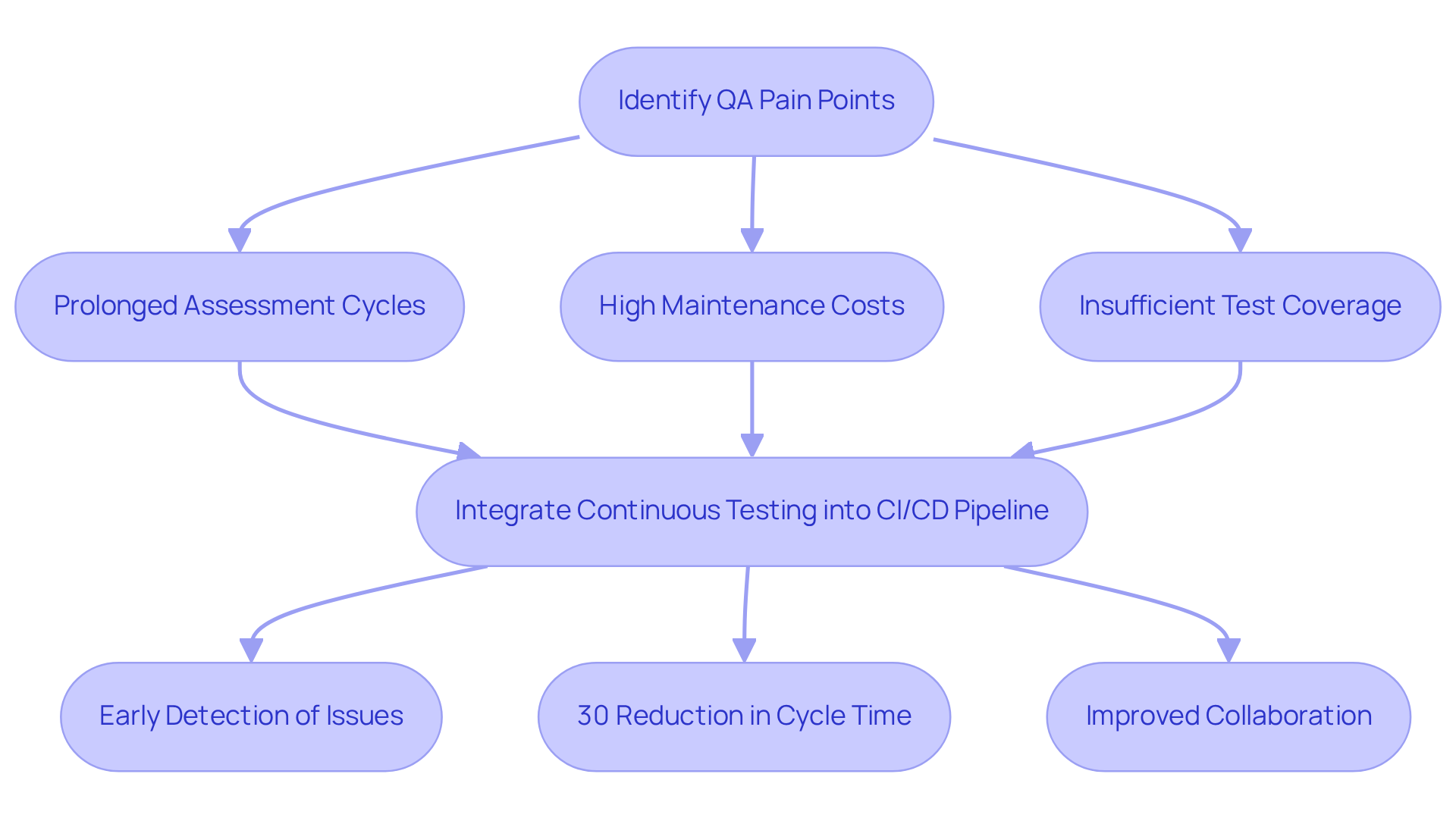
Revolutionizing Software Quality Assurance: The Impact of AI Continuous Testing
Developers often encounter significant challenges in ensuring application assurance. AI continuous testing is transforming this landscape by automating assessment procedures and delivering real-time insights into performance. By leveraging AI algorithms, teams can achieve a reported 85% increase in test coverage while significantly reducing issue detection times. This leads to improved software release quality.
Furthermore, the adaptive nature of AI allows it to learn from historical data, refining evaluation strategies based on past performance. This ensures ongoing relevance and effectiveness. As of 2025, the adoption of AI-driven testing solutions has surged, with 16% of organizations integrating these technologies—up from just 7% in 2023. Firms employing AI tools report a 32% increase in test coverage, showcasing the concrete advantages of AI in enhancing software assurance.
In addition, Kodezi CLI functions as an independent solution for B2B engineering groups, enhancing code quality and resolving bugs prior to deployment. This versatility allows teams to quickly AutoHeal codebases, thereby enhancing programming productivity. Are you making the most of the advantages offered by AI continuous testing?
By utilizing Kodezi, teams can not only improve their coding practices but also ensure that the advantages of AI-driven solutions are fully realized. Explore the tools available on the platform to elevate your development process.
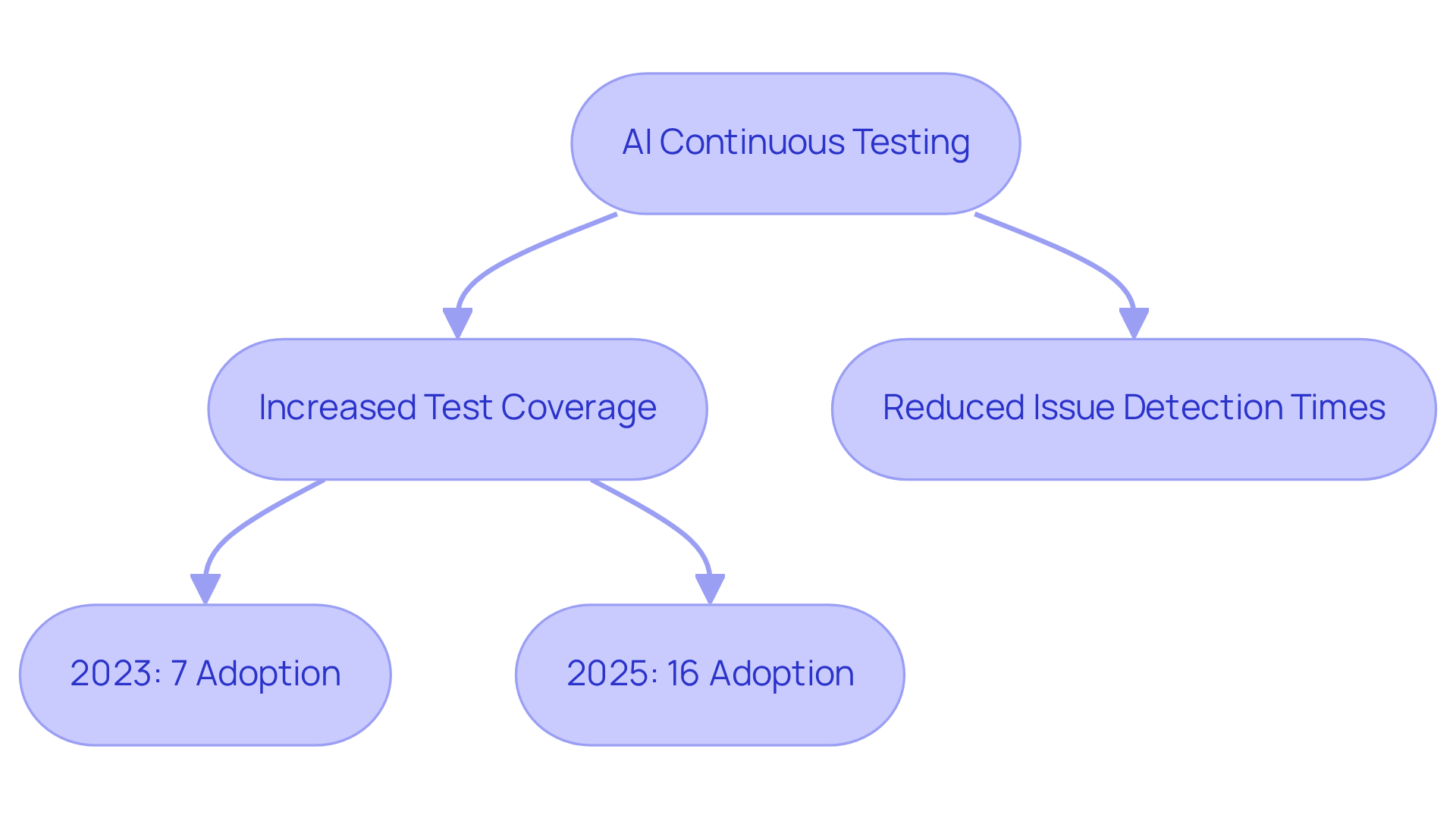
Conclusion
AI continuous testing is essential for overcoming the coding challenges that developers face today. By automating quality assurance processes, it not only enhances overall application performance but also streamlines testing procedures. This innovative approach significantly boosts productivity and improves code quality, making it crucial for organizations that wish to stay competitive.
Tools like Kodezi, BlazeMeter, and Digital.ai exemplify how AI-driven solutions can tackle common issues such as prolonged assessment cycles, high maintenance costs, and insufficient test coverage. These intelligent automation tools minimize manual efforts, foster collaboration among teams, and ensure applications meet the highest quality standards. Furthermore, organizations are experiencing notable reductions in defects and faster time-to-market, highlighting the growing recognition of AI's critical role in enhancing software quality.
As the software development landscape evolves, leveraging AI continuous testing is no longer just an option—it is a necessity. By adopting these innovative practices and tools, teams can significantly improve their coding processes. They can deliver high-quality software that meets the demands of today's fast-paced development environments. Explore the transformative power of AI continuous testing and elevate your development practices to embrace the future of software quality assurance.
Frequently Asked Questions
What is Kodezi and how does it assist developers?
Kodezi is a professional OpenAPI specification generator that automates quality assurance processes for API documentation. It integrates AI continuous testing to ensure documentation aligns with the codebase, reducing manual effort and minimizing errors.
What features does Kodezi offer for API documentation?
Kodezi offers features such as automatic creation of OpenAPI 3.0 specifications, hosting Swagger UI sites for API evaluation, automated code assessments, and synchronization of API documentation.
How does Kodezi improve productivity and code quality?
Kodezi enhances productivity by automating documentation updates, ensuring it reflects the current state of the code, which allows teams to focus on strategic tasks. This leads to improved code quality by minimizing outdated documentation and errors.
What challenges does BlazeMeter address for developers?
BlazeMeter addresses challenges related to performance and functionality testing of applications. It enhances testing efficiency by automating test creation and execution, enabling teams to quickly identify performance bottlenecks and functional issues.
How does BlazeMeter utilize AI technology?
BlazeMeter leverages AI technology to facilitate continuous testing by automating the creation and execution of tests, allowing for comprehensive assessment scenarios that replicate real-world user traffic.
What are the benefits of using Harness in software delivery?
Harness revolutionizes application delivery by incorporating AI continuous testing into the CI/CD pipeline, providing automatic assessments of code changes and instant feedback, which reduces defects and improves software quality.
What impact does AI continuous testing have on time-to-market and post-release defects?
Organizations using CI/CD pipelines experience an average decrease of 33% in time-to-market, and those implementing AI continuous testing report a 40% reduction in post-release defects.
How has the adoption of AI continuous testing changed recently?
The adoption of AI continuous testing has surged from 16% to more than 50% in 2025, indicating a growing recognition of its importance in enhancing software delivery quality.




